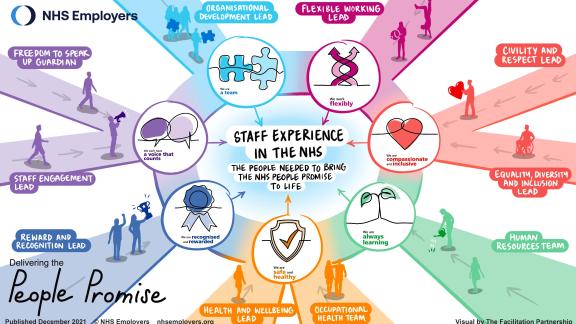NHS Disabled staff experiences during COVID-19 report
Key points
- 4,425 unique responses to the survey were received, of which 2,827 individuals self-identified as disabled.
- 59 per cent had declared their disability on the NHS Electronic Staff Record (ESR). 69 per cent of those that hadn’t declared their disability were not aware that they were able to. Whilst 7 per cent did not declare their disability due to a fear of stigma.
- 35 per cent were required to shield due to a long-term condition or disability. 28 per cent of respondents who shielded highlighted a lack of support from either their line manager, employer.
- 56 per cent had worked from home during this period. 84 per cent expressed that they would want to continue to work from home if their employer was able to support their preference in the future.
- 54 per cent felt that senior leaders were not visible in demonstrating their commitment to workplace disability equality during the first wave.
- 79 per cent were not aware of communications from their employer about the Workforce Disability Equality standard (WDES) and 87 per cent said that they did not have any opportunities provided by their employer to be involved in WDES conversations.

The COVID-19 pandemic has had a huge impact on people’s lives around the world. The NHS recognised the need to understand and learn from the lived experiences of disabled colleagues and to create workplaces in line with the NHS People Plan, where staff with a disability can feel included.
NHS England and NHS Improvement, in partnership with NHS Employers, conducted a survey during the pandemic and have published the findings in this report. The report outlines the working experiences of NHS disabled staff during the first wave of the pandemic between March 2020 and July 2020.
Six key areas were identified within the survey, many of them have broader and longer-term benefits and help to improve the working experience of disabled staff in the future. These included; recording of disability; risk assessments; shielding; home working; redeployment; leadership, communication and engagement.
Recommendations
The report contains nine recommendations in total, in particular it states:
- all NHS organisations have a disabled staff network
- programmes and initiatives need to be introduced to inspire talented disabled staff to become NHS leaders of the future
- line managers need to be better equipped and skilled to have meaningful health and wellbeing conversations with disabled staff
- NHS England and NHS Improvement to lead work to improve the NHS Electronic Staff Record (ESR) disability declaration rate to at least 4 per cent in England.
Actions
A number of the recommendations have already been acted upon, with positive steps taken by organisations across the NHS. These include:
-
Guidance, blogs and case studies published by NHS Employers highlighting disabled staff experiences and good practice around shielding and caring (for family dependents who have shielded).
- The NHS health and wellbeing framework published by NHS England and NHS Improvement, a video has also been published and is available on the NHS Future platform.
- NHS England and NHS Improvement guidance on supporting our working carers.
- The work of the Diversability network at West Hertfordshire Hospitals.
- How Oxleas NHS Foundation Trust supported staff who were shielding.
- The strategic approach taken by University Hospitals of Morecambe Bay NHS Foundation Trust to ensure that the voices of Disabled staff were heard, listened to and amplified.
Further information
Access the full report NHS Disabled staff experiences during COVID-19 and presentation slides to learn more.
Visit supporting disabled staff in the workplace to access additional guidance and resources, including information on making reasonable adjustments and health passports.



